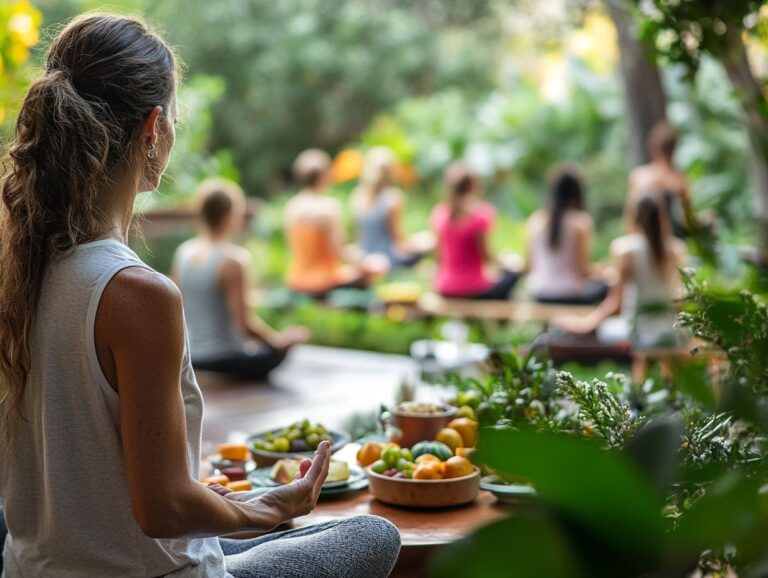Vegan Yoga is the practice of integrating the principles of plant-based living with mindful movement. This article will explore the interconnectedness of veganism and yoga, as well as the benefits of combining these practices for the body, mind, and spirit. If you’re considering a getaway, the UK offers some of the most breathtaking natural scenery in the world, along with a wonderfully diverse array of retreats to support your holistic journey. This article outlines what to expect and how to prepare for a nourishing experience for both the body and soul.
What is Vegan Yoga?
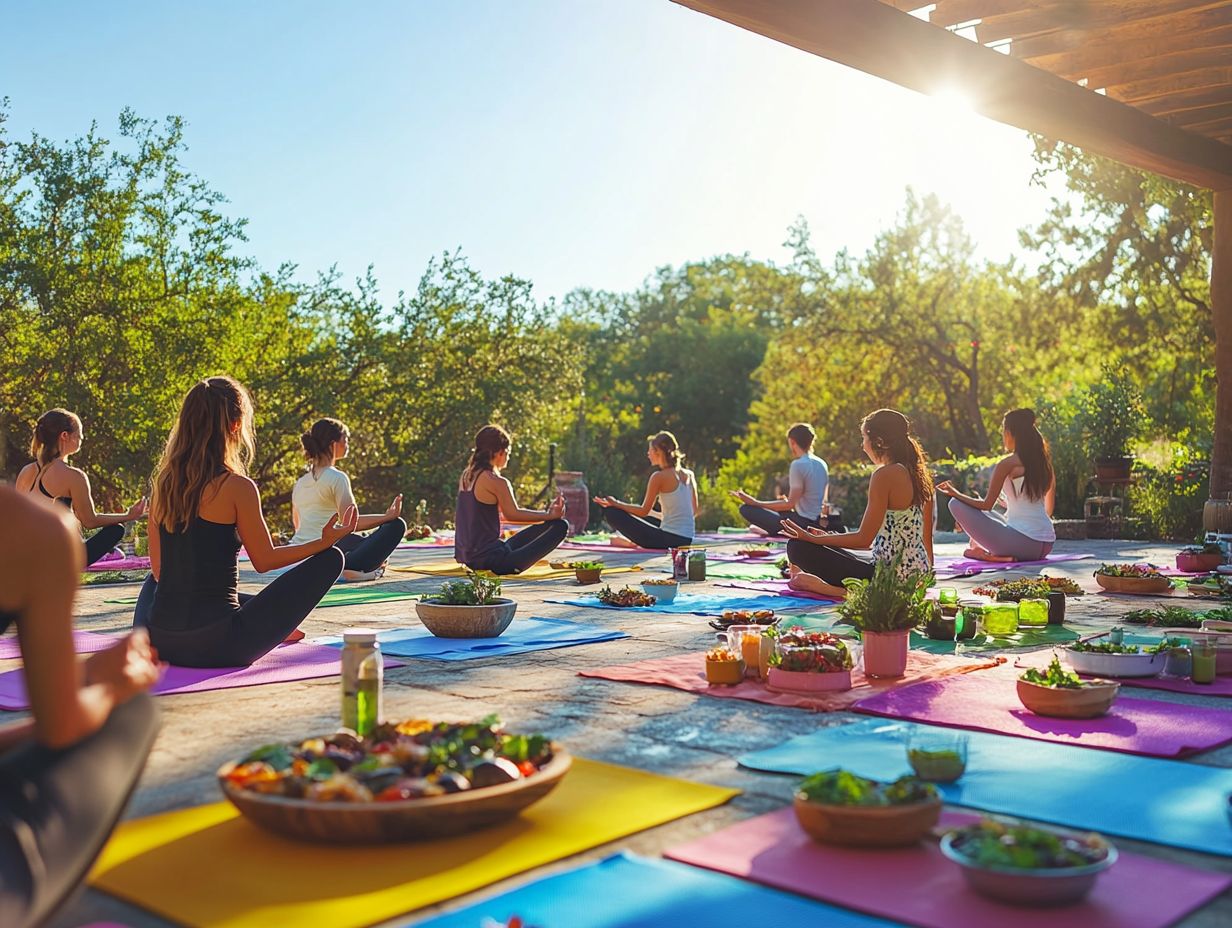
Vegan Yoga is a transformative journey that combines the principles of veganism with various forms of Yoga, including Chakra Yoga, Tantrik Yoga, and Sivananda Yoga, to achieve a harmonious balance of mind, body, and spirit.
At Karma Mama, participants are immersed in healing vibrations as they enhance self-enablement, cultivate positive intentions, and enjoy a restful weekend filled with nourishing meals and mindful walking experiences under the Full Moon. They may also participate in Reiki Healing and Tibetan Soundbath sessions for deeper relaxation.
How Does Veganism Connect with Yoga?
The relationship between veganism and yoga lies in their shared emphasis on a holistic approach to healthy living, which incorporates mindfulness, compassion for all sentient beings, and a lifestyle that benefits both the body and mind. This often includes the practice of pranayama and other breathing exercises to enhance the mind-body connection.
This connection is particularly strong in promoting energetic flow within individuals through the alignment of chakras. Chakras are believed to be energy centers in the body that can become blocked or imbalanced. Practices such as Reiki Healing and Chakra Yoga are common in these sessions to restore balance.
Vegan yoga workshops often provide guidance on dietary practices that align with yoga philosophy, focusing on light, plant-based foods that help unblock chakras and restore balance to energy centers.
Participants engage in practices that foster self-awareness, such as meditation and pranayama, while also discussing nutrition and the advantages of a vegan lifestyle.
The combined effects of these practices not only detoxify the body but also enhance mental clarity and emotional well-being, demonstrating how the synergy between veganism and yoga can significantly uplift an individual’s physical, emotional, and mental health.
What Are the Benefits of Vegan Yoga?
The advantages of Vegan Yoga are numerous, positively affecting physical, mental, and spiritual well-being, which in turn enhances overall wellness and promotes a healthy lifestyle.
Participants in restorative weekends can experience improved strength and flexibility, enhanced mental clarity, emotional release, and a deeper spiritual connection with themselves and the universe.
These benefits arise from practices such as yoga, Pranayama, and Tibetan Soundbath.
1. Physical Benefits
The physical benefits of Vegan Yoga include improved flexibility, increased strength, and enhanced overall fitness, often evident during a restorative weekend of practice. Participants might also experience a rebirthing experience through transformative energy work.
Ashtanga yoga features a vigorous sequence of postures that can improve muscle tone and overall strength. In contrast, Iyengar yoga, which emphasizes precision and alignment, is particularly effective for enhancing posture and stability. Both these styles are often recognized and accredited by Yoga Alliance for their rigorous standards.
Both styles contribute to increased strength, flexibility, and physical fitness, which are essential for maximizing energy levels. The flowing sequences and mindful breathwork facilitate effective oxygen circulation throughout the body.
When combined with a plant-based diet, individuals frequently experience heightened physical vitality, leading to more effective yoga sessions.
2. Mental Benefits
The mental benefits of Vegan Yoga include fostering a sense of peace, mindfulness, and emotional resilience through activities such as Meditation Magic and Positive Outlook Workshops.
These activities incorporate essential techniques like mindful walking and focused breathing, which help individuals develop a deeper awareness of their thoughts and feelings. As participants engage in these holistic practices, they often discover effective methods to reduce stress and manage anxiety.
Additionally, the emphasis on plant-based nutrition enhances these mindfulness practices by promoting mental clarity and emotional stability. Research suggests that guided meditations and visualization techniques can improve one’s ability to focus and maintain a positive outlook on life.
3. Spiritual Benefits
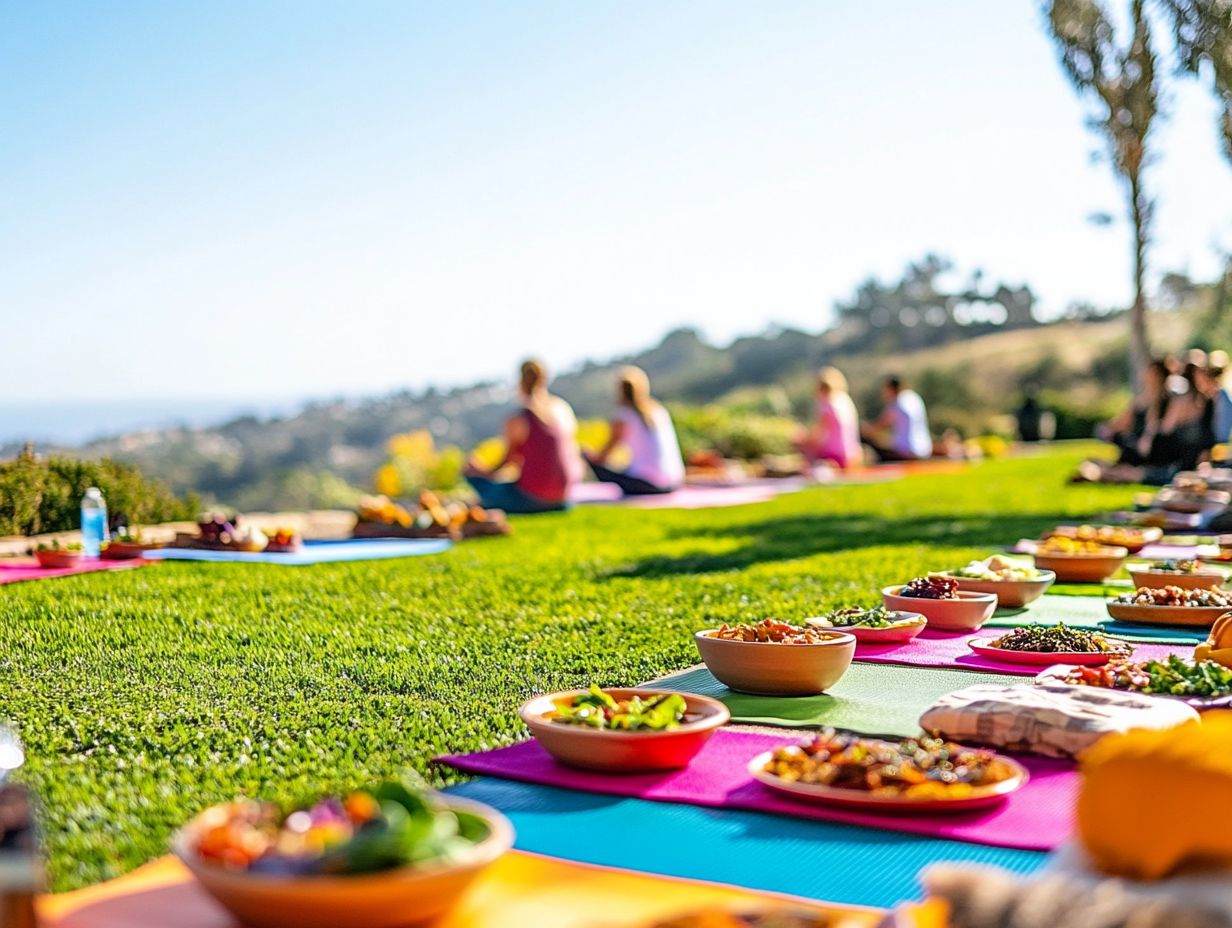
Participants often find that the spiritual benefits of Vegan Yoga are the most significant aspect of the practice. Through methods such as Chakra Yoga, Reiki Healing, and Tantrik Yoga, individuals can enhance their self-enablement and connect with their higher spiritual selves, experiencing profound manifestations of their intentions.
The experiences and testimonies of Vegan Yoga practitioners during retreats indicate that the communal aspect of these events is vital to their spiritual journeys. Deep bonds are formed with others who share similar beliefs and motivations related to a vegetarian or vegan lifestyle and its deeper spiritual connections.
As mindfulness techniques and practices, such as group meditations, become part of their daily routines, practitioners share their personal journeys of enablement and how these experiences relate to those around them. The supportive nature of these interactions often leads to noticeable transformations, as heightened energies create a collective experience that enables individuals to shed their former selves and enter a new state of being.
Psychological tools like breathwork and guided visualization are frequently employed in these practices to help individuals connect more profoundly with their true selves. This journey fosters inner peace and a sense of connection with others, nature, and the universe or a higher power.
As practitioners deepen their understanding of the philosophies associated with veganism, they also begin to adopt a lifestyle that embodies these beliefs, benefiting both their bodies and souls for years to come. The integration of Ayurvedic principles can further enhance their holistic health journey.
Why Choose the UK for a Vegan Yoga Getaway?
The UK offers a distinctive setting for a Vegan Yoga retreat, featuring breathtaking natural scenery, a diverse range of retreats and workshops, and a vibrant wellness community. Popular retreat locations include the Isle of Wight, Glastonbury Tor, and Somerset, all known for their serene environments.
From the picturesque landscapes of the Isle of Wight to the mystical aura of Glastonbury Tor, participants can immerse themselves in nature while engaging in transformative practices that promote healing and self-discovery.
1. Stunning Natural Scenery
The stunning natural scenery found in the UK, ranging from lush forests to pristine beaches, creates the perfect backdrop for a Vegan Yoga retreat, offering an ideal environment for reconnecting with nature and oneself during a rejuvenating weekend. Locations like Snowdonia and Tywyn provide majestic settings for deep meditation and mindfulness.
The rugged mountains and serene lakes of Snowdonia provide a majestic setting that fosters deeper meditation and mindfulness. The fresh air and breathtaking views inspire practitioners to focus on their breath and movement while cultivating a profound sense of peace and connection with the earth.
In Somerset, the rolling hills and picturesque countryside create a tranquil atmosphere where participants can engage in yoga sessions with panoramic views of the verdant landscape, enriching their physical practice and nurturing their spiritual growth.
These beautiful settings not only enhance the overall retreat experience but also promote mental clarity and emotional balance, essential components of a holistic Vegan Yoga practice.
2. Wide Range of Retreats and Workshops
The UK is home to numerous vegan yoga retreats and workshops, such as those offered at Tanglewood Wellness Center, Sunset Bay Retreats, and Plantation Villa, catering to a variety of interests and skill levels. Lapwing Farm is another notable retreat that provides immersive experiences.
These retreats provide unique experiences, including immersive weekend getaways that blend daily yoga sessions with cooking classes focused on plant-based cuisine. For instance, Tanglewood Wellness Center offers a holistic approach that emphasizes not only yoga practice but also mindfulness and meditation, fostering a balanced and restorative environment for personal development.
Similarly, Sunset Bay Retreats engages participants with dynamic and invigorating yoga sessions while encouraging them to connect with their inner selves through workshops on sustainable living.
These diverse offerings attract individuals from all walks of life, ranging from beginners to advanced practitioners, and help cultivate a community united by shared values and transformation through the principles of vegan yoga.
3. Embracing the Vegan Lifestyle
Vegan Yoga retreats in the UK focus on the vegan lifestyle and provide participants with nourishing meals while offering workshops on plant-based living and holistic health.
These retreats delve into the culinary aspects of veganism as well as the nutritional science behind plant-based foods, enabling participants to learn how to create healthy, balanced diets that supply the necessary nutrients for thriving.
Additionally, the workshops address ethical issues related to a vegan lifestyle, such as the environmental impact of meat production and animal welfare concerns, which are significant considerations for many attendees.
By incorporating hands-on cooking classes, facilitated discussions, and expert-led lectures, these retreats foster a multifaceted learning environment that enables individuals to make informed choices.
Daily practices of yoga and mindfulness further help participants understand how a vegan lifestyle can enhance their well-being while fostering a sense of community with others who share similar values.
What to Expect on a Vegan Yoga Getaway in the UK?
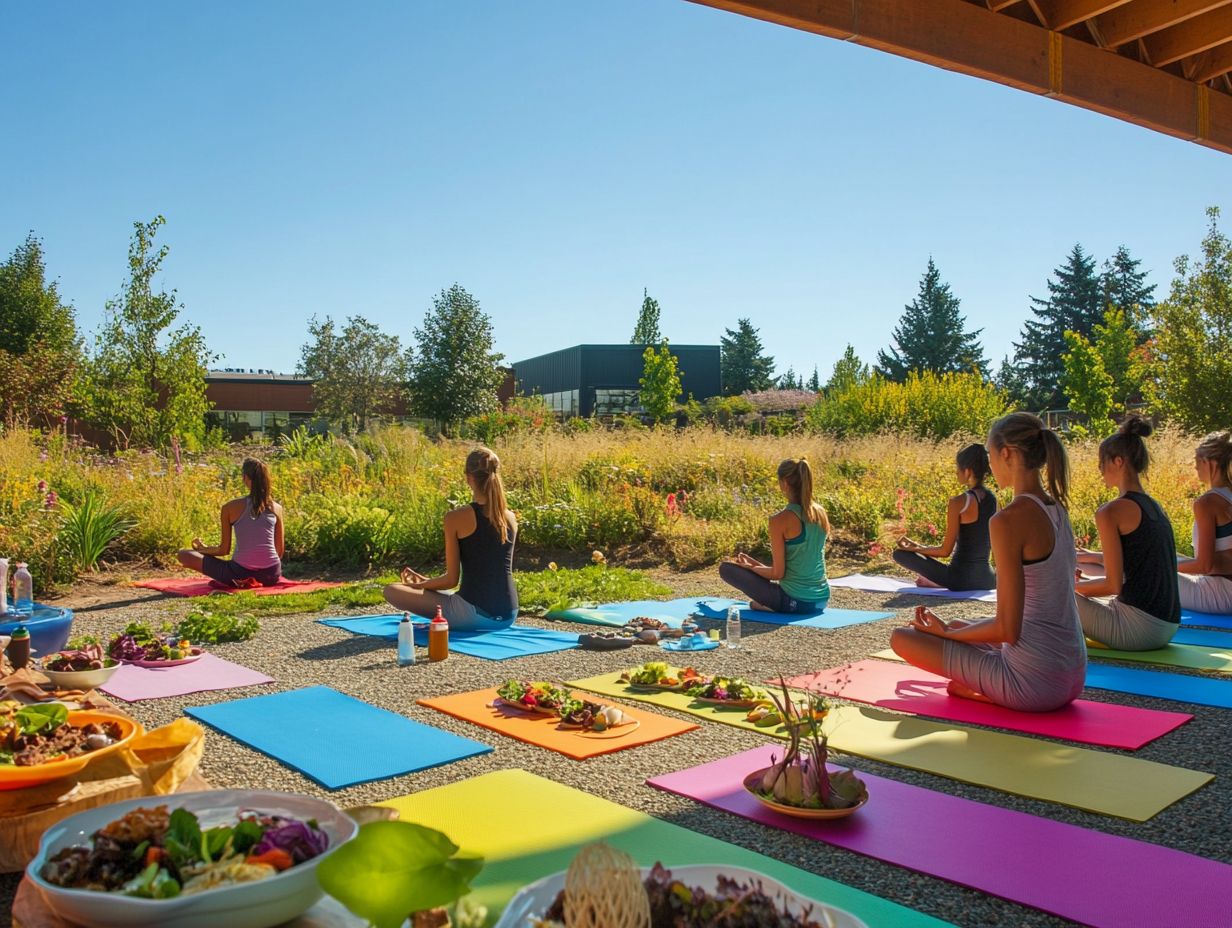
A vegan yoga retreat in the UK offers daily yoga classes, nutritious vegan meals, and activities designed to promote well-being and foster a connection to nature.
1. Daily Yoga Classes
During your stay, you can expect daily yoga classes that range from Ashtanga to Iyengar, designed to fit all levels from beginners to advanced practitioners. These classes offer a comprehensive approach to improve physical, mental, and spiritual health, aligning with the holistic principles of Vegan Yoga.
As part of the Vegan Yoga experience, daily yoga classes are offered, providing participants with a variety of styles ranging from Chakra Yoga and Sivananda to restorative classes that benefit both the body and mind.
The classes are designed to accommodate all levels of expertise, catering to newcomers seeking to improve their flexibility as well as more experienced practitioners looking to deepen their understanding of spiritual alignment.
Participants can explore various aspects of yoga, including:
- Hatha, which emphasizes breathing and alignment;
- Vinyasa, which is faster-paced and focuses on flow;
- Yin Yoga, which encourages deep stretching and meditation;
- Iyengar, which focuses on precision and alignment;
- Ashtanga, a vigorous and disciplined practice.
Along with the physical benefits, these classes align with a vegan lifestyle by emphasizing compassion and promoting holistic wellness. The inclusion of pranayama practices, such as breath control, further enhances the participants’ spiritual and physical well-being.
2. Delicious Vegan Meals
Participants at the retreat can enjoy health-focused vegan meals that are designed to be nourishing and enhance their overall wellness experience. These nourishing meals are satisfying and feature seasonal, locally sourced ingredients that showcase the best flavors of the region.
A plant-based diet helps participants achieve higher energy levels and improve digestive health, aligning perfectly with their wellness objectives.
The retreats often include special culinary components such as cooking workshops and farm-to-table dining experiences, which educate participants about sourcing and preparing their meals.
By using organic vegetables, whole grains, and superfoods, the meals ensure a combination of health and flavor, making them a vital aspect of participants’ transformative experiences.
3. Mindful Activities and Workshops
Mindful activities and workshops are essential components of a Vegan Yoga retreat, as they foster personal growth, self-empowerment, and positive intention-setting.
Participants can engage in a diverse range of experiences that nourish both their minds and spirits. For instance, guided meditations and Tibetan soundbath sessions create a calming environment, offering participants the space and time to reflect, center themselves, and strengthen their connection to their true selves.
Workshops on vegan cooking not only teach valuable skills but also inspire creativity in the kitchen, allowing participants to explore new flavors while nourishing their bodies. Additionally, Positive Outlook Workshops encourage participants to cultivate a more optimistic mindset.
Additionally, talks on self-improvement equip participants with practical tools and insights for their daily lives. Many attendees have reported transformative experiences, feeling a deeper connection to themselves and the vibrant community around them, fostering bonds through shared experiences of learning and growth.
4. Connecting with Nature
Connecting with nature is an essential aspect of a Vegan Yoga holiday, which incorporates mindful walking through the UK’s stunning landscapes, such as Glastonbury Tor and Snowdonia. This immersion in the surroundings enables participants to appreciate the beauty around them while achieving an optimal state of inner peace and joy.
Group hikes along coastal paths or through forests, such as those in Tywyn or the Isle of Wight, foster deeper connections among participants, allowing them to breathe fresh air and experience the soothing sounds of nature. Practicing meditation and yoga outdoors amidst beautiful backdrops grounds the mind and spirit.
As participants savor plant-based meals that highlight the region’s seasonal offerings, they may find that their overall well-being is enhanced, promoting cognitive clarity and spiritual development through the alignment of body, mind, and nature.
How to Prepare for a Vegan Yoga Getaway?
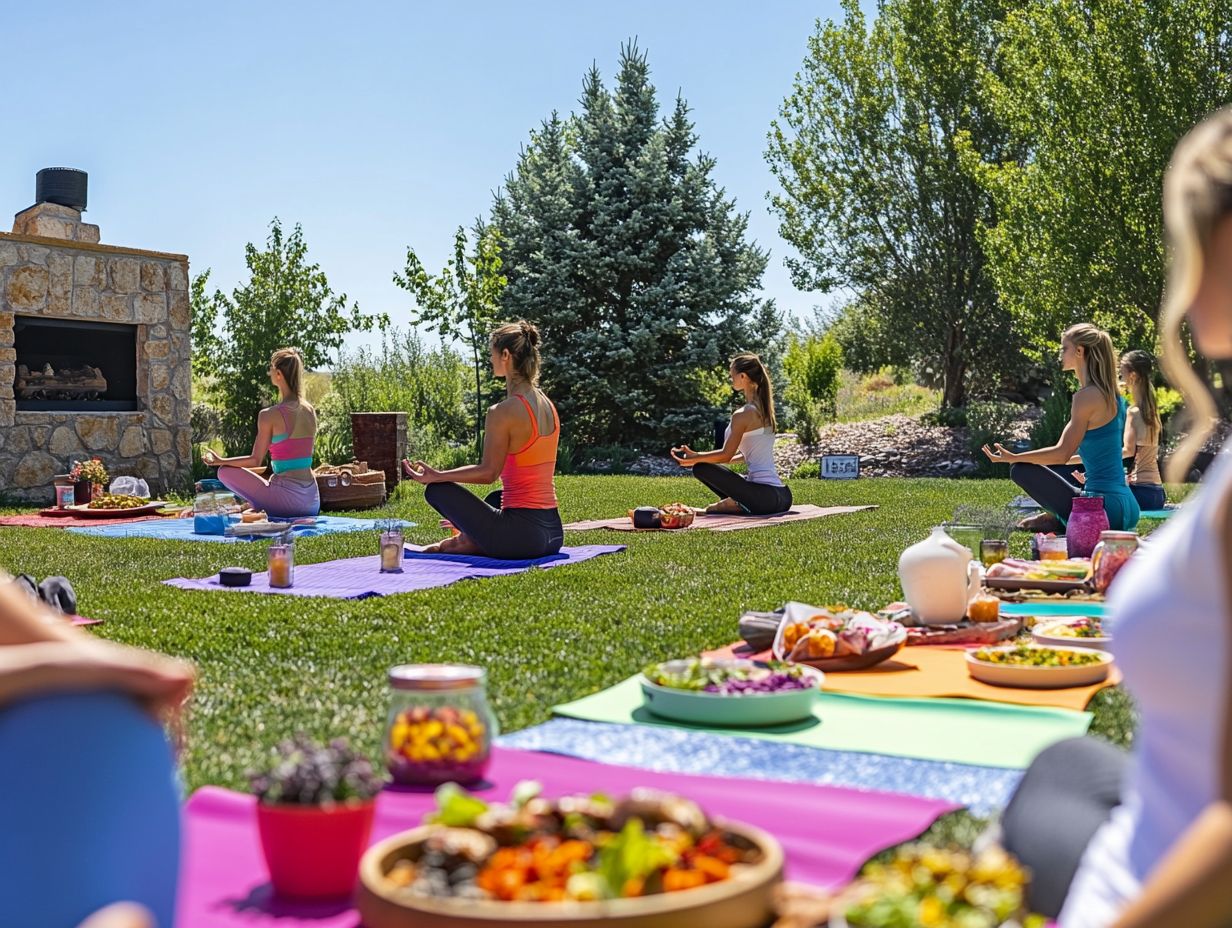
Preparing for a vegan yoga retreat involves researching various retreats and workshops, packing appropriate clothing and gear, and setting intentions for your experience.
1. Research Different Retreats and Workshops
Researching vegan yoga retreats and workshops is essential for finding the one that aligns with your individual goals and desires. First, it is important to identify what you hope to gain from the experience, whether it’s deepening your practice, making new friends, or simply relaxing. This clarity will guide you in choosing the right retreat, whether it be at locations like Plantation Villa, Sunset Bay Retreats, or Tanglewood Wellness Center.
Next, examine the curriculum offered by various retreats. Does it include teachings on topics that interest you, such as mindfulness, nutrition, or advanced yoga techniques like Tantrik Yoga or Reiki Healing? Additionally, consider the experience and credentials of the instructors to ensure they are qualified to help you achieve your objectives, such as certifications from Yoga Alliance.
Finally, take the time to read reviews and testimonials from past participants. These insights can help you set realistic expectations and understand how others have benefited from their experiences.
2. Pack Appropriate Clothing and Gear
Packing appropriate clothing and gear is essential for ensuring a comfortable and enjoyable Vegan Yoga experience. This preparation allows participants to be ready for various activities and weather conditions.
Whether it’s a serene morning yoga session, an invigorating afternoon hike, or evening workshops that require flexibility and focus, having the right items can make a significant difference.
It is important to choose lightweight, breathable fabrics for yoga attire, as these materials promote freedom of movement and help regulate body temperature, particularly in warmer climates. Participants should also consider packing supportive yoga mats, meditation cushions, and eco-friendly water bottles to stay hydrated while on the go.
Additionally, bringing personal items such as toiletries, sunscreen, and insect repellent can enhance comfort during outdoor explorations. Thoughtfully curated gear ensures that each participant can fully engage in the retreat experience while remaining grounded in their wellness journey.
3. Inform Retreat Organizers of Any Dietary Restrictions
Before attending your Vegan Yoga retreat, it is important to inform the organizers about any dietary restrictions you may have. Doing so will help ensure that meal preparation runs as smoothly as possible.
The more candid you are about your preferences and concerns, the better the organizers can create meals that cater to your specific needs. This open communication encourages the organizers to thoughtfully consider the types of food they serve and the importance of including a diverse range of vegan options that accommodate various dietary restrictions.
Encouraging this kind of dialogue benefits everyone, as it helps participants adhere to their dietary beliefs more easily.
4. Set Intentions for the Getaway
Setting intentions for your vegan yoga retreat can significantly enhance the experience by providing clarity on personal goals and fostering a mindset of mindfulness throughout the retreat.
By taking the time to reflect on what you truly wish to achieve—whether it be improving your yoga technique, gaining knowledge of plant-based nutrition, or seeking inner peace through practices like Reiki Healing and Chakra alignment—participants can create a clearer roadmap for their journey.
Journaling can be especially beneficial, as writing down thoughts allows participants to articulate their desires and conduct self-reflection during the retreat. Additionally, starting each day with meditation and pranayama can create a space for quiet, individual reflection, helping to ground intentions in the present moment.
This intentionality not only enriches the retreat experience but also helps participants align with their personal transformation, leading to lasting change long after the retreat concludes.




